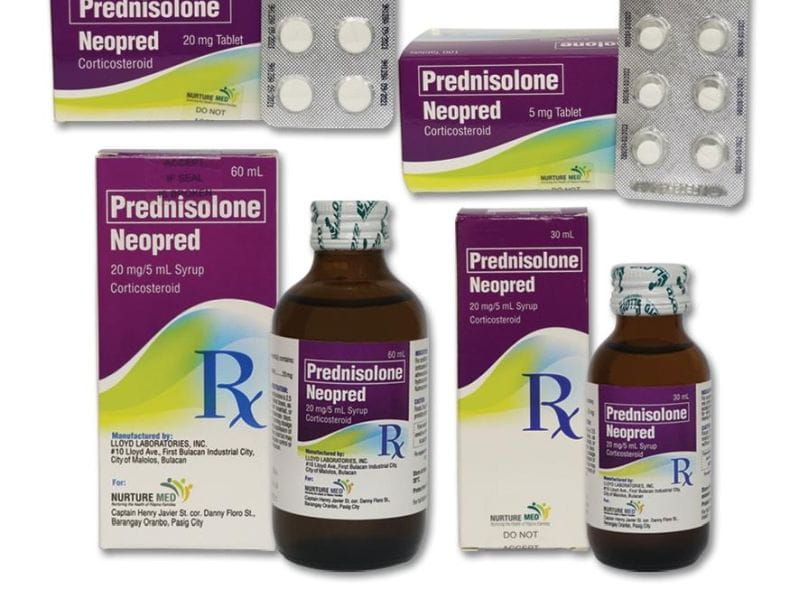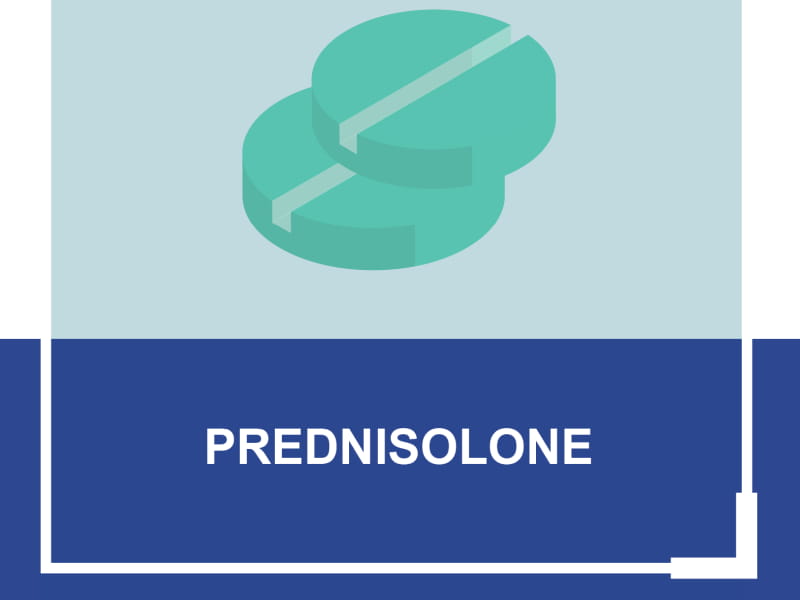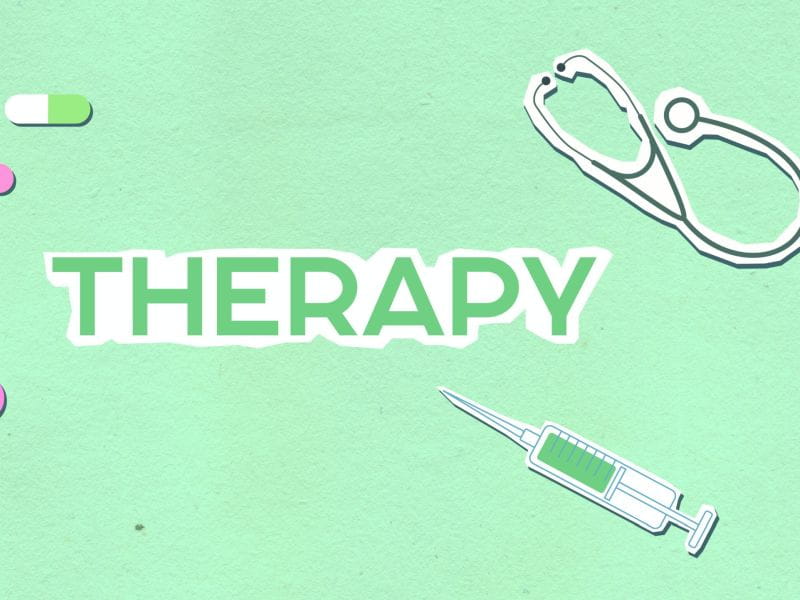Prednisolone is a medication used to treat various conditions, including allergic reactions, asthma, arthritis, ulcerative colitis, lupus, psoriasis, and certain types of cancer. It works by reducing inflammation and suppressing the body’s immune system. Prednisolone is taken by mouth, injected into a muscle, or applied to the skin. Common side effects that might be observed in patients are nausea, headache, and dizziness. Serious side effects may consist of an increased risk of infection, bone loss, and a decrease in the body’s ability to fight infection.
Prednisolone is a member of a group of medications known as corticosteroids, which are synthetic drugs designed to mimic the effects of hormones produced by the body’s adrenal glands. It is typically used to treat conditions that cause inflammation, such as allergies, asthma, and certain types of arthritis. It can also treat certain types of cancer, such as lymphoma and leukemia.
Prednisolone is a powerful medication and should only be taken under the supervision of a doctor. Taking medicine as prescribed is important, as it can have serious side effects if not handled properly. It is also important to monitor for any changes in mood or behavior while taking prednisolone.
Table of Contents
- Uses Of Prednisolone
- Side Effects Of Prednisolone
- How To Manage The Side Effects Of Prednisolone?
- How Does Prednisolone Dosage Impact Side Effects?
- Why Prednisolone Is Good For Cancer Treatment And For What Type Of Cancer Is It Used?
- Price Of Prednisolone In India And Worldwide
- How Does Prednisolone Work?
- How Is Prednisolone Consumed?
- Preventive Measures To Be Taken Before And After Consuming Prednisolone
- Who Should Avoid The Consumption Of Prednisolone?
- Conclusion
Uses Of Prednisolone

Prednisolone is a corticosteroid drug used to treat various health conditions, including allergies, skin conditions, asthma, Crohn’s disease, and certain types of cancer. It is also used to help manage certain types of arthritis. Prednisolone works by reducing inflammation in the body, which can help alleviate symptoms of the condition being treated.
The most common uses of prednisolone include treating allergies, skin conditions, asthma, and arthritis. It can treat allergies by reducing inflammation, allowing the body to fight off the allergen better. Prednisolone reduces rash and itching for skin conditions such as eczema. In asthma, prednisolone helps to reduce airway inflammation, allowing the patient to control symptoms better. In arthritis, prednisolone helps to reduce inflammation in the joints, allowing for better mobility and less pain.
Prednisolone is also used to treat certain types of cancer, such as lymphomas. It works by reducing inflammation in the body, which can help slow the growth of cancer cells. Lastly, prednisolone is sometimes used to treat Crohn’s, an inflammatory bowel disease. It helps to reduce inflammation in the digestive tract, allowing for better digestion and absorption of nutrients.
Overall, prednisolone is an effective medication for treating various conditions, including allergies, skin conditions, asthma, arthritis, cancer, and Crohn’s disease. Speaking with a doctor before using prednisolone ensures the best outcome.
Side Effects Of Prednisolone

Prednisolone is a corticosteroid medication used to treat many different medical conditions. It is a synthetic form of the naturally occurring hormone cortisol. Prednisolone is often prescribed to reduce inflammation and suppress the immune system. It is commonly used to treat conditions like asthma, allergies, autoimmune disorders, and certain types of cancer.
Common side effects of prednisolone include nausea, vomiting, stomach upset, increased appetite, weight gain, dizziness, insomnia, headache, and increased sweating. Other side effects are changes in mood, difficulty concentrating, irritability, confusion, memory problems, and changes in blood pressure and heart rate.
Prednisolone can also cause serious side effects, including an increased risk of infection, slowed wound healing, thinning of the skin, increased risk of blood clots, increased risk of cataracts, muscle weakness, increased risk of osteoporosis, and increased risk of diabetes. Long-term prednisolone use can also cause adrenal suppression, leading to Cushing’s syndrome, in which the body produces too much cortisol.
Rare side effects of prednisolone include seizures, mood swings, depression, psychosis, and allergic reactions. If any of these side effects occur, it is important to seek medical attention immediately.
Prednisolone Side Effects In Adults
Prednisolone is a corticosteroid medication used to treat various conditions, including allergies, asthma, autoimmune diseases, and certain forms of cancer. While prednisolone can be an effective treatment, it can also cause side effects. Common side effects in adults include:
- Increased appetite and weight gain: Prednisolone can cause an increase in appetite and can lead to weight gain in some people.
- Nausea and vomiting: Prednisolone can cause nausea and vomiting.
- Headache: Prednisolone can cause headaches in some people.
- Increased risk of infection: Prednisolone can suppress the body’s ability to fight diseases such as colds, the flu, and other illnesses.
- Mood changes: Prednisolone can cause mood changes, including mood swings, depression, and anxiety.
- Sleep disturbances: Prednisolone can cause sleep disturbances, including insomnia and daytime drowsiness.
- Gastrointestinal problems: Prednisolone can cause gastrointestinal side effects, such as abdominal pain, diarrhea, and heartburn.
- Skin problems: Prednisolone can cause skin problems, such as rash, itching, and acne.
- Muscle weakness: Prednisolone can cause muscle weakness, leading to decreased mobility and balance.
- Adrenal insufficiency: Long-term prednisolone use can cause adrenal insufficiency, a condition where the adrenal glands do not produce enough cortisol.
- Osteoporosis: Prednisolone can increase the risk of osteoporosis, a condition characterized by weak bones.
Prednisolone Side Effects In Men
Prednisolone side effects in men may include:
- Weight gain: Prednisolone can cause weight gain, particularly around the face, abdomen, and upper back. This may be a result of an increase in appetite.
- Mood changes: Prednisolone can cause mood changes, such as feeling anxious, depressed, or irritable.
- Increased risk of infection: Prednisolone can suppress the immune system and increase the risk of developing infections.
- Changes in blood sugar levels: Prednisolone can cause changes in blood sugar levels, leading to increased thirst and urination.
- Gastrointestinal problems: Prednisolone can cause nausea, vomiting, diarrhea, and abdominal pain.
- Increased risk of bone fractures: Prednisolone can weaken bones and increase the risk of fractures.
- Changes in blood lipid levels: Prednisolone can cause changes in blood lipid levels, leading to an increased risk of heart disease.
- Fluid retention: Prednisolone can cause fluid retention, leading to swelling in the hands, feet, and ankles.
- Cataracts: Prednisolone can cause cataracts, which are a clouding of the eye’s lens.
- Acne: Prednisolone can cause acne, particularly in those prone to it.
- Sleep disturbances: Prednisolone can cause insomnia and other sleep disturbances.
- High blood pressure: Prednisolone can increase blood pressure.
- Muscle weakness: Prednisolone can cause muscle weakness, leading to difficulty walking and doing other activities.
Prednisolone Side Effects On Women
Common side effects in women include:
- Acne: Prednisolone can cause acne, especially in women prone to acne.
- Weight gain: Prednisolone can cause weight gain in some women, especially when taken longer than two weeks.
- Mood changes: Prednisolone can cause depression, anxiety, irritability, and other mood changes.
- Increased appetite: Prednisolone can cause an increase in appetite, leading to weight gain.
- Headaches: Prednisolone can cause headaches, which may be accompanied by dizziness.
- Menstrual changes: Prednisolone can cause changes in the menstrual cycle, such as irregular periods or heavy bleeding.
- Gastrointestinal problems: Prednisolone can cause nausea, vomiting, stomach upset, and diarrhea.
- Swelling: Prednisolone can cause facial, ankle, and foot swelling.
- Vaginal yeast infections: Prednisolone can increase the risk of vaginal yeast infections.
- Bone loss: Prednisolone can cause bone loss, increasing the risk of fractures.
- High blood pressure: Prednisolone can cause high blood pressure.
- Cataracts: Prednisolone can increase the risk of developing cataracts.
It is vital to talk to your doctor if you are experiencing any of the side effects listed above. Your doctor may be able to adjust your dosage or prescribe a different medication.
Short-Term Prednisolone Side Effects
Prednisolone is a medication that is commonly used to treat a variety of inflammatory and autoimmune conditions. It is also used to treat some types of cancer. Prednisolone is available as an oral tablet, an oral solution, an intravenous solution, and an intramuscular injection.
Short-term side effects of prednisolone can include:
• Increased appetite.
• Weight gain.
• Fluid retention.
• Trouble sleeping.
• Mood changes.
• Increased blood sugar levels.
• Increased risk of infection.
• Acne.
• Increased risk of stomach ulcers.
• Thinning of bones (osteoporosis).
• Increased risk of cataracts and glaucoma.
• High blood pressure.
• Slowed growth in children.
• Stretch marks on the skin.
• Irritation and redness at the injection site (if injected).
• Cushing’s syndrome.
Contact your doctor immediately if you are taking prednisolone and experiencing any of these side effects.
Long-Term Effects Of Prednisolone
Long-term use of prednisolone may lead to several side effects, including:
- Increased risk of infection: Corticosteroids suppress the immune system, making people more vulnerable to infections.
- Weakened bones: Long-term use of corticosteroids can weaken bones, leading to osteoporosis and an increased risk of bone fractures.
- Weight gain: Prednisolone can cause weight gain due to increased appetite and water retention.
- High blood pressure: Prednisolone can raise blood pressure levels, increasing the risk of stroke and heart attack.
- Diabetes: Long-term prednisolone use can increase the risk of developing type 2 diabetes.
- Glaucoma: Prednisolone can increase the pressure inside the eye, leading to glaucoma.
- Cataracts: Long-term prednisolone use can increase the risk of developing cataracts.
- Muscle weakness: Long-term prednisolone use can cause muscle weakness, leading to difficulty walking and performing everyday activities.
- Mood changes: Prednisolone can cause mood swings and other mental health issues, such as depression and anxiety.
- Gastrointestinal problems: Long-term prednisolone use can lead to digestive issues, such as ulcers and bleeding.
How To Manage The Side Effects Of Prednisolone?

1. Monitor your blood sugar levels regularly: Prednisolone can cause high blood sugar levels, especially in people with diabetes. Evaluate your blood sugar levels regularly and report any changes to your doctor.
2. Monitor your blood pressure and cholesterol levels: Prednisolone can increase your blood pressure and cholesterol levels. Have your blood pressure and cholesterol checked regularly, and talk to your doctor if you have any concerns.
3. Avoid alcohol: Drinking alcohol while taking prednisolone can increase your risk of side effects.
4. Get regular eye exams: Prednisolone can cause changes in your vision. Regular eye exams ensure your vision is not affected by the medication.
5. Take your medication as prescribed: Make sure to take your medicines as prescribed by your doctor. Do not miss doses or stop consuming them without talking to your doctor.
6. Eat a healthy diet and exercise regularly: Eating a healthy diet and exercising regularly can help manage prednisolone’s side effects. Try to maintain a healthy weight and talk to your doctor about any dietary changes you should make.
7. Avoid contact with people who are sick: Prednisolone can weaken your immune system, making you more susceptible to infections. Avoid contact with people suffering; talk to your doctor if you feel unwell.
8. Talk to your doctor about other medications: Some can interact with prednisolone. Talk to your doctor about any medications or supplements you are taking.
How Does Prednisolone Dosage Impact Side Effects?

The dosage of prednisolone can have a significant impact on the side effects experienced by patients.
If the prednisolone dose is too high, the patient may experience a range of side effects, including increased appetite, weight gain, high blood pressure, mood swings, insomnia, and bone loss. Too much prednisolone can also lead to serious long-term side effects such as high blood sugar, cataracts, glaucoma, and an increased risk of infection.
On the other hand, if the prednisolone dose is too low, the patient may not experience any significant relief from their symptoms. They may also experience withdrawal symptoms such as fatigue, depression, and joint pain.
The key to reducing the risk of side effects from prednisolone is to find the lowest effective dose and to follow the doctor’s instructions carefully. Monitoring the patient’s condition and adjusting the dosage as needed is important. Patients should also be aware of the potential for side effects and report them to their doctor immediately.
About Prednisolone’s Overdose
It is important to take prednisolone exactly as prescribed by your healthcare provider. Taking too much prednisolone can lead to an overdose, which can cause serious side effects.
The symptoms of a prednisolone overdose may vary depending on how much of the medication was taken. Common symptoms include nausea, vomiting, headache, abdominal pain, dizziness, confusion, and drowsiness. In more serious cases, an overdose of prednisolone can lead to difficulty breathing, seizures, heart palpitations, and coma. If you or someone you know has overdosed on prednisolone, it is important to seek medical attention immediately. Medical treatment may involve supportive care, such as IV fluids and medications to counteract the effects of prednisolone. In more serious cases, dialysis or other measures may be needed to flush the drug from the body.
It is good to follow your healthcare provider’s instructions when taking prednisolone and never to take more than the recommended dose. If you have any questions or concerns, discussing them with your healthcare provider is important.
Prednisolone’s Overdose Management And Treatment Options
Prednisolone overdose treatment options depend on the amount and type of ingested drug. If a large amount was taken, the patient should be brought to the hospital for medical evaluation and treatment.
Once at the hospital, the medical team will assess the patient’s vital signs, blood pressure, heart rate, and breathing. Blood and urine tests may be conducted to determine the amount of drug in the system. Depending on the results, the medical team may administer activated charcoal to the patient to absorb any remaining medication in the stomach. Additionally, fluids may be given intravenously to help flush the drug out of the body.
If the overdose was intentional, the patient might also be given supportive care, such as a psychiatric evaluation, counseling, and medication to help reduce the risk of future overdoses. In some cases, the patient may be admitted to the hospital for further monitoring and treatment.
Why Prednisolone Is Good For Cancer Treatment And For What Type Of Cancer Is It Used?

Prednisolone is a corticosteroid medication used to treat many conditions, including cancer. Prednisolone works by suppressing the immune system and reducing inflammation. This helps to slow the growth of cancer cells and reduce the severity of cancer’s symptoms. Prednisolone is also used to reduce nausea and vomiting caused by chemotherapy and to treat pain associated with cancer. Prednisolone effectively treats certain types of leukemia, lymphoma, and multiple myeloma.
Additionally, it can be used to treat certain brain tumors and other cancers that have spread to the brain. Prednisolone is also used to reduce swelling and pain from tumors that have spread to the bones and to reduce the risk of infection in patients with weak immune systems caused by cancer. Prednisolone can also be prescribed to treat certain types of anemia and other blood disorders caused by cancer.
For What Type Of Cancer, Is Prednisolone Used?
Prednisolone is a medication used to treat various medical conditions, including cancer. It is a corticosteroid that suppresses the immune system and reduces inflammation. Prednisolone is commonly used to treat certain types of cancer, including:
• Lymphoma
• Multiple myeloma
• Leukemia
• Hodgkin’s lymphoma
• Non-Hodgkin’s lymphoma
• Breast cancer
Prednisolone is also used in the treatment of other cancers, such as:
• Myelodysplastic syndrome
• Neuroblastoma
• Ewing’s sarcoma
• Osteosarcoma
• Soft tissue sarcoma
• Gynecologic cancers, such as ovarian and cervical
• Prostate cancer
• Renal cell carcinoma
• Melanoma
Prednisolone can also be used to treat the symptoms of cancer, such as pain and swelling. It is also sometimes used to prevent the rejection of a transplanted organ.
Price Of Prednisolone In India And Worldwide
Prednisolone is available in oral, injectable, and topical forms in India. The cost of Prednisolone in India may vary from around Rs 10 to Rs 500, depending on the dosage and form. For example, a 5-mg tablet of Prednisolone may cost around Rs 10, while a 25-mg tablet may cost up to Rs 500. In the United States, Prednisolone may cost anywhere from around $6 to $150, depending on the dosage and form. For example, a 5-mg tablet of Prednisolone may cost about $6, while a 25-mg tablet may cost up to $150.
How Does Prednisolone Work?
Prednisolone is a type of steroid medication used to treat various medical conditions. It suppresses the body’s immune system, reduces inflammation, and decreases allergic reactions. The drug can be taken orally or intravenously, depending on the medical condition being treated.
Prednisolone is broken down in the stomach and absorbed into the bloodstream when taken orally. It then binds to glucocorticoid receptors in cells, which helps reduce the body’s inflammatory response. This reduces swelling, pain, and other symptoms associated with inflammation.
When taken intravenously, the medication is directly injected into the bloodstream and quickly enters the cells. It then binds to glucocorticoid receptors, which helps reduce inflammation and other symptoms associated with the condition being treated.
In addition to reducing inflammation and other symptoms, Prednisolone can help reduce the risk of further complications associated with the medical condition. For example, it can help reduce the risk of infection, improve the body’s ability to heal, and reduce the risk of organ damage.
How Is Prednisolone Consumed?

Prednisolone is a prescription steroid medication used to treat various medical conditions. It can be taken orally as a tablet, or it can be given as an injection.
1. Oral Tablets:
Prednisolone tablets come in several strengths and are usually taken once a day. It is important to take the medication simultaneously every day and swallow the tablets whole, with a full glass of water. Additionally, do not chew, crush, or break the tablets. Taking the medication with food is also important to reduce the risk of stomach upset.
2. Injections:
Prednisolone injections are typically given every other day. The injection is given into a muscle or a vein, depending on the condition being treated. It is vital to follow the instructions of the doctor or nurse administering the injection and to ensure it is given in a clean, dry area with no broken skin.
It is necessary to follow the dosage instructions given by the doctor carefully. Do not alter the dose or stop taking the medication without consulting your doctor first. If you experience any side effects, contact your doctor right away.
Preventive Measures To Be Taken Before And After Consuming Prednisolone

Preventive measures to be taken before consuming Prednisolone:
1. Tell your doctor about all your medical conditions, especially if you have high blood pressure, diabetes, liver disease, kidney disease, an infection, glaucoma, cataracts, osteoporosis, or a stomach ulcer.
2. Consult your doctor if you are pregnant, plan to become pregnant, or are breastfeeding.
3. Talk to your doctor about the risks and benefits of taking prednisolone if you are 65 years or older.
4. Tell your doctor if you take any medicines, including prescription and non-prescription medicines, vitamins, and herbal supplements.
5. Avoid being around people who have infections. Consult your doctor for preventive treatment if you are exposed to chicken pox or measles.
Preventive measures to be taken after consuming Prednisolone:
1. Get regular check-ups with your doctor to monitor your health while taking prednisolone.
2. Follow your doctor’s instructions for taking prednisolone and any other medications you are taking.
3. Avoid drinking alcohol while taking prednisolone.
4. Avoid being around people who are sick or have infections.
5. Monitor your blood sugar levels regularly if you have diabetes.
6. Monitor your blood pressure levels regularly if you have high blood pressure.
7. Avoid activities that may be dangerous if you are taking prednisolone.
8. Wear protective clothing, including a hat and sunglasses, to protect your skin from the sun.
9. Tell your doctor if you experience unusual symptoms while taking prednisolone.
Who Should Avoid The Consumption Of Prednisolone?

Prednisolone is a steroid medication used to treat various conditions, including allergic reactions, skin conditions, ulcerative colitis, breathing problems, and certain types of cancer. It is important to note that everyone should not take prednisolone, and certain people should avoid it.
People who should not take prednisolone include those who have active infections, have a history of tuberculosis, have a history of herpes simplex eye infection, have a history of mental illness or depression, have a history of congestive heart failure, have liver or kidney disease, have a weak immune system, or are pregnant.
In addition, people taking certain medications should not take prednisolone, as it can interact with some drugs and cause serious side effects. These medications include anticoagulants, aspirin, cyclosporine, insulin, ketoconazole, phenytoin, sulfonamides, and other medications used to treat arthritis and other inflammatory conditions. It is crucial to talk to your doctor before taking any medications, including prednisolone, to ensure that it is safe for you to take.
Conclusion
Prednisolone is an important medication commonly used to treat cancer. It is a corticosteroid (steroid) medication, and as such, it works by suppressing the body’s immune system, reducing inflammation, and slowing or halting the growth of cancer cells. Prednisolone has been used to treat many types of cancer, including leukemia, lymphoma, breast cancer, and multiple myeloma. It can be taken orally or intravenously.
Prednisolone has many potential side effects, including nausea, vomiting, and weight gain. It can also cause an increased risk of infection and an increased risk of developing high blood pressure. Talking with a doctor before taking prednisolone is important to ensure it is the right treatment for your cancer. Overall, prednisolone is an effective medication for treating cancer. However, it is necessary to know from your doctor the risks and benefits before taking it to ensure it is the right choice.
It can be daunting when dealing with the high cost of medical treatment in India, and that too without incurring any future debt. However, create a fundraiser on a crowdfunding platform is a great way to raise funds for a cause! It allows you to reach a wide audience and generate donations quickly. Plus, it’s easy to set up and manage.
You can create a crowdfunding page on platforms like ImpactGuru. Include compelling stories, photos, and videos to explain why your cause is important. Share your page on social media, email, and other sources to spread the word. With a crowdfunding platform, you can track your progress and see who has donated. Plus, you can reach out to donors to thank them for their support.
Ready to get started? Start a fundraiser today and make a difference!












